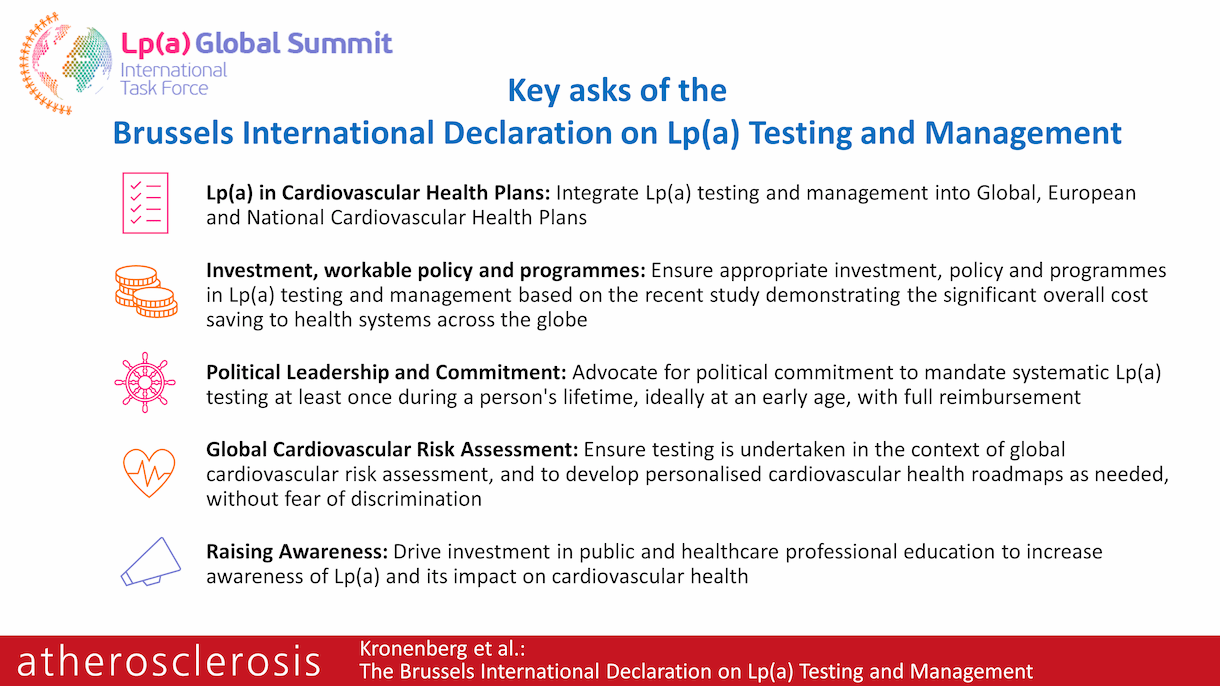
More than 1.4 billion people worldwide are living with elevated lipoprotein(a) [Lp(a)], an inherited, independent cardiovascular risk factor strongly linked to heart attacks, strokes, aortic stenosis, and premature cardiovascular events. Yet, only 1–2% of the population is tested. This staggering gap leaves millions vulnerable around the world and makes elevated Lp(a) one of the most under-recognised threats in global heart health.
The Brussels International Declaration on Lp(a) Testing and Management was co-created by the Lp(a) International Task Force, chaired by Prof. Florian Kronenberg, and global leaders at a Lp(a) Global Summit, held in Brussels, on March 24-25, 2025.
The Summit was hosted by Member of the European Parliament (MEP), Romana JERKOVIĆ, Chair of the MEP Cardiovascular Health Group , and under the patronage of the Polish EU Presidency. The event, organised by FH Europe Foundation, brought together cardiovascular health organisations, scientific experts, patient ambassadors and policy makers from the European Union and World Health Organisation.
The Declaration presents a shared global vision for equitable, systematic Lp(a) testing and care integration in efforts to prevent cardiovascular disease and instead to promote cardiovascular health. It presents five clear, actionable asks for governments, health systems, and global institutions. It is designed to align with and strengthen international CVD prevention strategies across the globe, including efforts like the EU Cardiovascular Health Plan, the European Health Data Space, and emerging national cardiovascular health plans.


We urge governments, health authorities, scientific and medical societies, patient organisations, and individuals to endorse the Brussels International Declaration and join the global movement to make Lp(a) testing routine and universally accessible, prevent the preventable, and ensure personalised prevention and management.
Now is the time to act and make a difference!
The Brussels International Declaration was published in Atherosclerosis (open access), the leading journal of lipids and cardiovascular science - a rare and powerful convergence of scientific consensus and political momentum. Read the Declaration and the accompanying editorial by Prof. Jan Borén, Prof. M. John Chapman and Prof. Chris J. Packard
The Brussels International Declaration on Lp(a) Testing and Management offers a transformative solution—a science-based, policy-driving call to action developed by the Lp(a) International Taskforce, convened by the FH Europe Foundation and led by Professor Florian Kronenberg, one of the world’s foremost experts in Lp(a). This landmark document was co-authored by an international panel of scientific and clinical leaders, alongside patient advocates whose lived experience shaped its urgency and ambition.
Launched during the first-ever Global Summit on Elevated Lp(a) - a high-level event hosted in Brussels on Lp(a) Awareness Day, 24–25 March 2025—the Declaration addresses elevated Lp(a) testing and management - an urgent public health gap and outlines a clear, science-based solution. Informed by expert consensus, lived patient experience, and the first International Cost-Effectiveness Study on Lp(a) Testing, it provides a strategic framework for countries and health systems to incorporate Lp(a) into routine cardiovascular disease prevention.
At the heart of the Declaration are five core policy recommendations, offering actionable guidance for national, regional, and global stakeholders:
In addition, the Declaration highlights the critical role of digital health innovations and ethical artificial intelligence in enabling systematic testing, improving risk stratification, and ensuring implementation is effective, measurable, and equitable.
What is elevated Lp(a)?
Elevated Lp(a) is an inherited, independent risk factor that affects 1 in 5 people worldwide, significantly increasing the risk of linked to heart attacks, strokes, aortic stenosis, premature cardiovascular events and peripheral arterial disease. Despite the strength of the scientific evidence, less than 2% of the global population is tested, leaving the vast majority unaware of their risk and without access to potentially life-saving preventive care.
Recognising that cardiovascular disease is the leading cause of death globally, and that the economic and social costs of inaction are rising in every region, the Brussels Declaration calls on governments, international agencies, scientific societies, health systems, and patient organisations to act collaboratively. The goal: to prevent the preventable by ensuring no one is left behind in the global fight against cardiovascular disease.